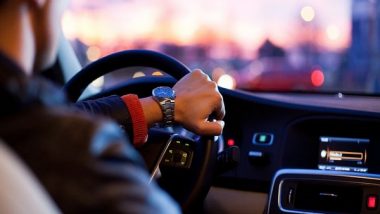New Jersey [US], November 22 (ANI): According to a new study, ridesharing trips might be able to reduce the number of alcohol-based accidents.
This research has been published in the 'Journal of Studies on Alcohol and Drugs'.
Also Read | Tamil Nadu Shocker: Minor Girl Lured With Ice Cream by 52-Year-Old Neighbour, Sexually Assaulted.
Researchers from Columbia University Mailman School of Public Health and colleagues studied statistics from the Chicago Data Portal for November 2018 to December 2019. They matched 962 alcohol-involved crashes with 962 that did not involve alcohol, and they specifically looked at the density per square mile of ridesharing trips that were in progress at the time of the crash.
The researchers chose Chicago specifically because it's one of the few locations in which rideshare data--including information about where each trip started and ended--are released publicly at the trip level. This level of detail was necessary to improve the understanding of ridesharing's positive and negative impacts.
"We found the density of active rideshare trips near a crash site was associated with decreased odds that the crash was alcohol involved," said Christopher Morrison, PhD, assistant professor of epidemiology at Columbia Mailman School.
"These results are consistent with the suggestion that ridesharing replaces impaired-driver trips," he added
Specifically, an increase of one rideshare trip per square mile was associated with 0.2 per cent decreased odds that a crash was alcohol-involved. Although the benefits for one rideshare trip were small, the sheer volume of rideshare trips and alcohol-involved crashes on Chicago roads meant the overall impacts could be substantial.
This study came as welcome--although not surprising--news to the two biggest ridesharing providers.
Kristin Smith, head of global road safety policy at Uber, said, "We do think this research underscores what we've been hearing for years--that greater access to transportation through technology can help people make the right choices, plan ahead and avoid driving drunk."
Smith pointed to a number of studies published just this year, including one that showed that drunk driving traumas and DUIs were reduced in the city of Houston after Uber entered the market.
"We're pleased to see this research in line with other research, showing that rideshare and Uber have a direct impact on reducing drunk driving," she said.
A spokesperson for Lyft was pleased with the study as well.
According to Lyft's Director of Community Safety Policy Kamillah Wood said, "Alcohol-involved crashes continue to be a public health dilemma, taking a devastating toll on innocent victims and their families. We're grateful for this research, as it illuminates the impact ridesharing can have on reducing drunk driving and helping to keep communities safe."
The study pointed out that ridesharing services are available in 263 cities in the United States, and they have facilitated more than 11 billion rides since beginning to operate around 10 years ago. Ridesharing may be an appealing option for consumers because they can avoid both the risk of drunk driving and the potential inconvenience of public transportation.
Morrison concluded that although some research showed ridesharing may be associated with an increase in other public health problems--such as pedestrian crashes--these findings supported the use of ridesharing to tackle the specific problem of drunk driving.
"Drunk driving is devastating for the people who drive drunk and for other drivers and passengers with whom they share the road," said Morrison.
"We can use this information to help reduce these enormous health costs," Morrison added.
This research was funded by the Centers for Disease Control and Prevention. (ANI)
(This is an unedited and auto-generated story from Syndicated News feed, LatestLY Staff may not have modified or edited the content body)














 Quickly
Quickly
















